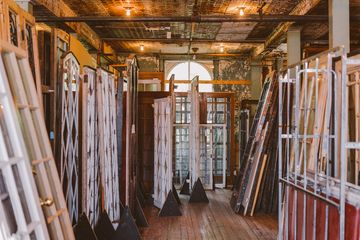Evan Blum, owner of Demolition Depot, has been in the business of salvaging and renovating architectural art for forty-two years. He grew up “entrenched in the arts, ” as he put it, since his father was an architect, his uncle was a well-known illustrator, and his grandfather was a craftsman, to name a few of the multiple examples he cited of artistic genes in the family. Evan had always had an interest in architectural artifacts, and upon seeing the beautiful and historic buildings around the city being torn down, he was motivated to save as much of them as he could by collecting worthwhile pieces, repairing them, and then selling them to new owners. “What we do is create art out of the construction waste stream, ” he explained. Sixty percent of what is in landfills comes from demolition, and by saving and re-selling the valuable parts of these buildings, he said he is able to minimize the amount that would otherwise be laid to waste, as well as keep the objects’ history alive. It is his attempt to “‘un-tragedy’ the tragedy of demolition, ” and to find interesting things buried within the mundane. Evan tries to repurpose as many things as he can, hence the eclectic and wide-ranging nature of his merchandise. While walking through the space on 125th Street, we were amazed by the sheer volume of fascinating and beautifully preserved items that we came across - and Evan pointed out that this is only one of his many facilities, so it is difficult to fathom the real scope of his collection. Each of the four floors of the shop housed a labyrinthine assortment of doors, stained glass windows, crucifixes, plumbing fixtures, mirrors, candlesticks, and more. When asked, Evan told us that there is not necessarily a single architectural style or period preferred by his clients. He shared the story of the rise in popularity of Gothic pieces after Cher started her Gothic furniture catalog in the 1990s. It used to be that no one wanted to buy anything salvaged from churches, he remarked, but after the catalog was released, the demand for the previously unpopular Gothic artifacts he had collected over the years surged. This is part of why he stores and saves everything he has found - as it is likely that at some point what was unwanted will become trendy and appealing again. When asked how he selects his pieces, Evan told us that his combined background in architecture, sculpting, manufacturing, and craftsmanship helps him envision which antiques would work well as focal pieces in modern spaces. In fact, a unique and integral aspect of his service is that he acts as “a designer’s designer and architect’s architect, ” giving clients his input on how to improve their projects and best utilize their spaces. While many of his clients are hotels and restaurants looking for distinctive additions to their décor, he also does work with set designers in search of elements for their latest film and TV projects, or celebrities who want to incorporate antiques into their homes. He has also outfitted some pieces in well-known museums, including the American Wing of the Metropolitan Museum of Art. While discussing his plans for the future, Evan mentioned that he will be starting an auction business, Harlem Country Auctions, behind the shop toward the end of the summer of 2017. Doing so will allow him to preserve even more artifacts, since he will be auctioning any art (e. g. paintings, sculptures, lamps, decorations) that are not "architectural, " and therefore do not fall under the purview of Demolition Depot. In the more distant future, he hopes to create his own museum where he will be able to display his salvaged art for the appreciation of the general public.
